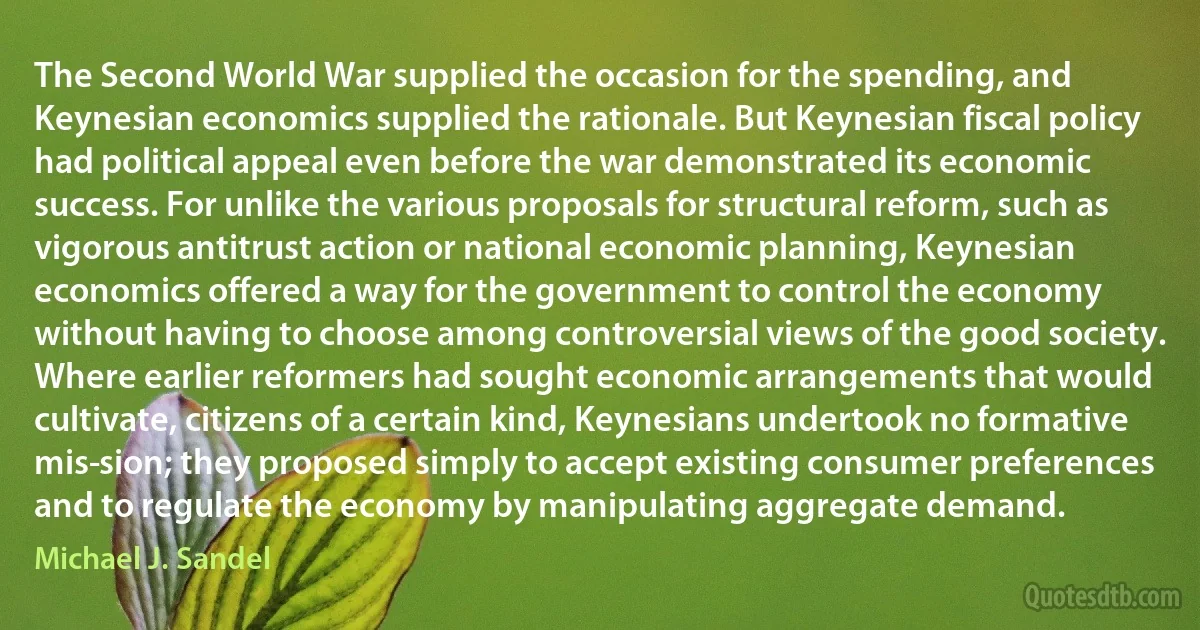
The Second World War supplied the occasion for the spending, and Keynesian economics supplied the rationale. But Keynesian fiscal policy had political appeal even before the war demonstrated its economic success. For unlike the various proposals for structural reform, such as vigorous antitrust action or national economic planning, Keynesian economics offered a way for the government to control the economy without having to choose among controversial views of the good society. Where earlier reformers had sought economic arrangements that would cultivate, citizens of a certain kind, Keynesians undertook no formative mission; they proposed simply to accept existing consumer preferences and to regulate the economy by manipulating aggregate demand.
Michael J. SandelRelated topics
action aggregate certain choose consumer control early economics fiscal formative good government having kind national occasion planning second seek spending structural success war way world keynesianRelated quotes
The ultimate "causes of price" - to use a Classical term - lie deeply embedded in the psychology and techniques of mankind and his environment, and are as manifold as the sands of the sea. All economic analysis is an attempt to classify these manifold causes, to sort them out into categories of discourse that our limited minds can handle, and so to perceive the unity of structural relationship which both unites and separates the manifoldness. Our concepts of "demand" and "supply" are such broad categories. In whatever sense they are used, they are not ultimate determinants of anything, but they are convenient channels through which we can classify and describe the effects of the multitude of determinants of the system of economic magnitude.

Kenneth Boulding
Those who had most insistently demanded the innovation of the referendum, because they thought it would produce exactly the opposite result, were temporarily stunned by the sudden revelation that they were populists without the support of the people. Now they have recovered from their concussion and seek to reopen the issue. ... Even if they had a coherent alternative policy, which they do not, it would wreck itself upon the rock of inconstancy. ... No one any longer expects us to be a rich country. But with an almost touching faith they still hope that we will be consistent and reliable. It is exactly this store of remaining national credit which the false democrats who first demanded and now deny the referendum seek to undermine.

Roy Jenkins
Traditionally, economic analysis treats the economic system as one of the givens. The term "design" in the title is meant to stress that the structure of the economic system is to be regarded as an unknown. An unknown in what problem? Typically that of finding a system that would be, in a sense to be specified, superior to the existing one. The idea of searching for a better system is at least as ancient as Plato's Republic, but it is only recently that tools have become available for a systematic, analytical approach to such search procedures. This new approach refuses to accept the institutional status quo of a particular time and place as the only legitimate object of interest and yet recognizes constraints that disqualify naive Utopias.

Leonid Hurwicz
The very name of my subject, economics, suggests economizing or maximizing. But Political Economy has gone a long way beyond home economics. Indeed, it is only in the last third of the century, within my own lifetime as a scholar, that economic theory has had many pretensions to being itself useful to the practical businessman or bureaucrat. I seem to recall that a great economist of the last generation, A. C. Pigou of Cambridge University, once asked the rhetorical question, "Who would ever think of employing an economist to run a brewery?” Well, today, under the guise of operational research and managerial economics, the fanciest of our economic tools are being utilized in enterprises both public and private.

Paul Samuelson
It is my firm belief that the only satisfactory test of economics is the ability to predict, and in crucial predictive situations such as reconversion after World War II, the settlement of the Korean War, the settlement of the Vietnam War, the abrupt economic policy switch of the Nixon Administration in August 1972, the oil shock of 1973 (forecast of a world-wide succession by LINK), the recession of 1990. In these crucial periods, econometric models outperformed other approaches, yet there is considerable room for improvement, and that is precisely what is being examined in development of high-frequency models that aim to forecast the economy, every week, every fortnight, or every month, depending on the degree of fineness of the information flow.

Lawrence Klein
